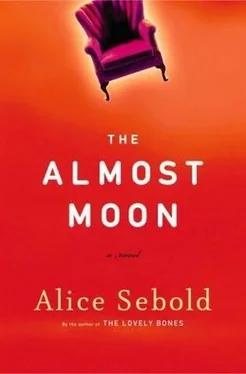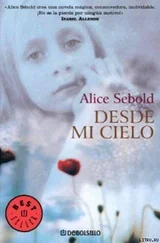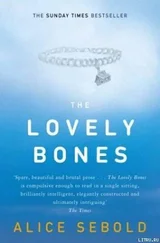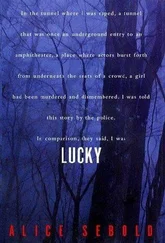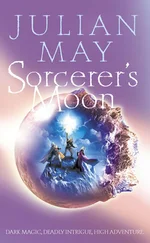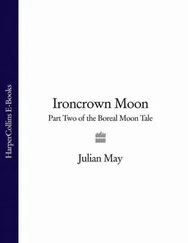He took something from his pocket, a set of silver keys, and threw them at me. They landed at my feet.
I squatted down to get them.
“My mom won’t forgive you,” he said. “She’s turning very moralistic in her old age.”
I could feel already that I would be outside soon, that I would put the key I held in my hand into the ignition and back the car out of the driveway.
“Maybe it’s Sarah I’m meant to end up with,” he said. He took a swig of his milk. “After all, I love her mother.”
It was like a sock in the stomach, and he saw it.
“Too much,” he said. “I know.”
“I have to go now, Hamish,” I said, wishing I could leave him with some perfect phrase.
“Where?”
“I haven’t figured that out yet,” I lied. “I’ll leave the car somewhere. I’ll call you and let you know where it is.”
He turned. I grabbed my purse from the table and followed him through the kitchen and then the living room. I saw a vase I’d given Natalie countless years ago. It was filled with store-bought flowers.
Behind the garage where Hamish kept the extra cars he worked on, he got inside a nondescript late-’80s Ford and signaled for me to wait. He turned the engine on and backed up until the nose of the car was facing toward the street, then got out with the engine still running.
All I could see was the open car, waiting. All I could think was with each leave-taking, those who remained behind were safe from me.
“I wish I was enough to make you stay,” Hamish said. He hugged me, and for a moment he was my father and I was his child.
He stroked my hair and then squeezed me one last time for emphasis. I felt the increased heft of my purse on my forearm.
“I’m here if you need me.”
I nodded my head. Words had begun to desert me for the first time.
“Take care of yourself,” he said. “I’ll wait for your phone call.”
“Phone call?”
“About the car.”
“Thank you, Hamish. Tell your mother I said good-bye.”
I got into the driver’s seat and tucked my purse beside me. Only the final click of the car door shutting made me sure that I could go.
I did not look at him again. I put the car into gear and started down the driveway, passing to the right of Hamish’s car and onto the grass. As I reached the road, I turned on the radio. Swing music, when I had expected heavy metal or alternative rock. I listened to the muted cheer, then shut it off. I tucked in my chin and made the left toward Phoenixville.
It was still early in the evening. The clock on the dash read 7:08, and traffic along the road outside Natalie’s was such that I felt the need to concentrate. I saw minivans and SUVs pulling off into driveways and versions of these same cars disgorging men or women carrying grocery bags and dry cleaning. Lamps went on in downstairs windows, and blue lights flickered from large-screen televisions.
When I reached the end of this new prosperity and took the still more abandoned stretch of road toward my old neighborhood, I felt myself calm a bit. Here the land had begun to be sold and quartered like so much meat, but there were also dilapidated houses tucked up between trees or, more sadly, so near the road that they would never be able to escape the influx of population despite shut-up windows or white-noise machines. The occupants of these old houses wouldn’t even know what a white-noise machine was. Things such as noise-cancellation headphones or expanded cargo holds were foreign concepts to them. As members of my parents’ generation, they sat and suffered until death, and I had reached the age where I glimpsed why this seemed preferable to keeping up.
There was one man who had taken matters into his own hands and built a ten-foot cinder-block wall around his entire property. He regularly sprinkled the top with broken beer bottles, which spilled over the side. No matter how many fines or threats of demolition came from the county, he would not tear the wall down. The war between the city officials and this homeowner had been going on for a decade with seemingly no end, and though he had made the local papers repeatedly, there was never a picture of him. I had begun to think of him as a homunculus who contained within him all the fears of modern man. There were no pictures of him because he looked like all of us. His fear had made him into a phantom who changed shape behind his walls. He was my mother, hiding in the linen closet. He was my father, drawing shadows on sheets of plywood. He was Natalie, afraid of loneliness, or Sarah, stealing change. He was me as I passed his house at 7:23 on a Friday night, going to Mrs. Leverton’s. I hoped, as he roared and thundered and fought off every lawsuit or claim, that he would survive forever or, if not, would at least die thrashing and spent long after all our deaths.
I drove into Phoenixville proper, the old part of town, where revitalized businesses still shut down at five p.m. and the streets were empty except for small clusters of activity that revolved around insular community projects. I saw Antipode, the sculpture gallery, all lit up. It was a hub for the arty in the area, and I had gone there more than once. It had been the scene of my drunken date with Tanner. He and the owner, surrounded by people much younger than they were, had engaged in a one-upping concerning each other’s relevance.
“That was the saddest display I’ve seen in a long time,” I said as the two of us stumbled out onto the sidewalk.
“Oh, shut up!” he had cried. “What have you ever done?” And our companionable misery began.
Antipode was bright but quiet tonight. I saw movement toward the back. A show was being hung. Down the block, the wheeled carts of the Paperback Shack, which were brought in each night, had been knocked over onto the sidewalk and into the road. The owner, a lone old woman, stooped to pick them up, no doubt regretting her attempt to stay open longer for the sake of attracting after-work customers.
I pulled over into an empty spot and got out. I gathered up a group of tattered romances strewn in the road, their busty cover art faded from long days in the sun. But what caught my eye was a heap of moldy poetry books, seemingly adhered to one another, that had fallen as one. The names appeared Russian to me. Quickly I scanned the titles and knew immediately: these were the books Mr. Forrest had donated to the local library thirty years ago. “They are deficient in their Russians,” he had said to me.
I startled the woman when I said, “Excuse me,” and held out the two stacks of paperbacks.
She spit toward me, spraying my hand as well as the books.
“I’ll put them here,” I said, and laid them on the trunk of a stripped-down Lincoln Continental.
As I walked back to my car, I could hear her muttering. I had read about the poet Marina Tsvetaeva and how she had hung herself from a coat hook. How was that possible? I had thought at the time. Ceiling fixtures, trees-yes. But doorknobs or coat hooks?
Shooting yourself in the head was, I’d been told, a message suicide, but what kind of message had my father been leaving? I had scoured the house for a note afterward, looked in his drawers and under his pillow, and ended up washing down the stairwell with old rags, determined to erase the only marks he’d left.
I neared my mother’s neighborhood, and a hot wave of dread began to prickle across my spine and back, tiptoeing along my shoulder blades and turning into gooseflesh. I could not explain why, exactly, but I sensed I should not even pass through the place, much less stay the night. I was also tired. It was easier for me to attribute the strange shifts in my body to a forlorn exhaustion-the futility and ruin of the last twenty-four hours taking over my heart, my limbs, my mental firings-than to know I was merely a robot that had gone off the rails and that, after serving its master faithfully for years, had turned back predictably to the place where it was made.
Читать дальше
